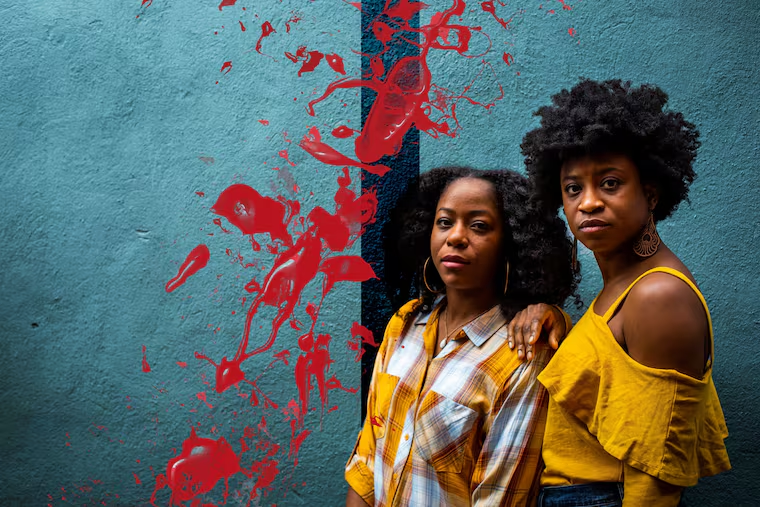Wilma Theater is putting on the acclaimed ‘Is God Is’ as an audio play, recorded from quarantine
One of the Philadelphia theater season’s most-anticipated productions, "Is God Is," never made it to the stage of the Wilma Theater. The version premiering Thursday was recorded in isolation.

One of the Philadelphia theater season’s most anticipated productions, Is God Is, never made it to the stage of the Wilma Theater. But starting Thursday, the Wilma’s production of Aleshea Harris’ Obie-winning play is getting a hearing as an audio version, recorded in isolation, that will be available for streaming through Sunday.
Directed by James Ijames, the theater’s first audio play stars Danielle Lenée (My General Tubman) and Brett Ashley Robinson (Describe the Night) as twin sisters, Racine and Anaia, who are dispatched by their mother on a cross-country mission that Ijames calls “an entertaining sort of revenge fantasy story” (one that in some other productions has involved sizable amounts of blood).
In an interview Tuesday, Ijames, a co-artistic director of the Wilma, said that in adapting the play for audio, Harris’ script had remained intact.
“Honestly, we changed not a single word,” he said. And with everyone looking at their scripts, “there’s not even a chance of an actor saying the line wrong. We truly honored that text. I love that play.”
The challenge in adapting it to audio was figuring out “how do you get the scale that we were going to try to reach in production with just the voice and just sound. And I’m shocked at what you can do. This cast of actors is so impressive. And they all just came to it with so much hunger,” Ijames said. “And the sound design team has been truly remarkable.”
To maintain consistent sound quality, the actors were sent mics and other equipment, “everything that you would possibly need to do a really sophisticated recording in your home,” Ijames said. “We even sent them these, like, cloth panels and little boxes that had insulation that they could set around their mics to lower the ambient sound, because everybody lives in Philly. The streets are not always quiet.”
Beyond that, “for folks whose internet speed was a little slow, we did things to try to bump up their speed so that they could be on par with everyone else,” he said. For one actor, Aaron Bell, a studio was set up in the sanitized and otherwise empty Wilma “because we just couldn’t get his internet speed up to the level [they needed].”
Lenée, who had gone to Maryland to stay with family during the lockdown, set up her own studio in a closet, Ijames said.
Directing from a distance, he tried to maintain the emphasis on sound.
“We rehearsed over Zoom so that I could see them when I was talking to them and giving notes,” he said. “And then we would turn all of our screens off. … We just had this black screen and we would just listen. And then we recorded it.”
Though it wasn’t written for audio, Is God Is turned out to have opportunities a stage presentation might not have exploited.
“There are these moments in the play where we’re recounting a memory and … we got to be a little cinematic with it, like we could sort of mimic the sound of the memory,” Ijames said, citing a moment when the mother, She [Melanye Finister], is “talking about walking down the hall and hearing the little girls with the cartoons on the television and it sounded like there was a tree branch scratching on the window.”
Onstage, it would have been up to Finister alone to describe it, but in the audio version, the team was able to insert “a hint of a cartoon in the background,” he said.
And then there’s the violence.
“I don’t want people to think that this is like this bloody thing that’s one violent thing after another. It’s actually quite funny, too,” Ijames said.
But also violent.
In the audio version, “the violence exists for the listener in the sound of someone experiencing violence. So the cry of pain, the cry of shock of ‘Oh my God, you just hit me’ — I didn’t expect that to be as powerful as it was.”
Working in audio “was completely foreign to everyone except for Thom Weaver, who was the production’s set and lighting designer but is a huge fan of radio plays and actually made the suggestion to do this,” Ijames said. Weaver “pulled in Chris Sannino to work with Daniel Ison, who’s the sound designer for the production.”
Asked if he’d learned anything in trying to create theater during lockdown, Ijames said he’s realized that “just because it’s always been done this way doesn’t mean that it has to be.”
In working on Is God Is, “a large part of the decision-making … was [about] what is going to be the healthiest thing for the artists who have to work on this,” he said. “That was paramount to us. And I don’t know that that’s always paramount when we’re thinking about production.”
He said he tried to “make sure that care was a thing that I was leading with, every time I sat down at that desk, and turned on Zoom, and talked to those actors.” He also tried to display what he called “radical vulnerability” as a director, admitting that he didn’t always know all the answers but assuring the cast that they’d get there together.
Looking ahead to post-pandemic life, “I hope that we’re all different, but I definitely will be a different director.”
“Is God Is,” available to stream Thursday through Sunday via wilmatheater.org. Tickets start at $10 and are structured as donations. Patrons who bought tickets for the show’s original run and elected to donate the cost rather than receive refunds will also receive a link to the show.